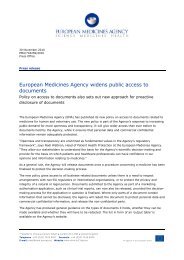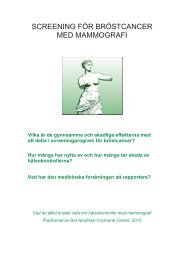1 Selective serotonin reuptake inhibitors (SSRI) â sales, withdrawal ...
1 Selective serotonin reuptake inhibitors (SSRI) â sales, withdrawal ...
1 Selective serotonin reuptake inhibitors (SSRI) â sales, withdrawal ...
You also want an ePaper? Increase the reach of your titles
YUMPU automatically turns print PDFs into web optimized ePapers that Google loves.
In 1998, it was stated that <strong>SSRI</strong>s do not lead to dose escalation and drug seeking behaviour<br />
(Committee on Safety of Medicines, 1998) - two of the dependence criteria in Diagnostic Statistical<br />
Manual of Mental Disorders IV (21). In 2003, the symptoms of <strong>SSRI</strong> discontinuation were<br />
compared to the DSM-IV and ICD-10 dependence criteria (22), with the conclusion that the extent<br />
to which <strong>SSRI</strong>s met the criteria “is much less” than other dependence producing drugs (Committee<br />
on Safety of Medicines, 2003). Although drug seeking behaviour in relation to the <strong>SSRI</strong>s was<br />
acknowledged in 2004, and the review showed that the <strong>SSRI</strong>s met three out of the required three<br />
criteria for the diagnosis of dependence, the conclusion was similar to the 2003 conclusion<br />
(Committee on Safety of Medicines, 2004).<br />
Different terms<br />
Drug regulators use the term <strong>withdrawal</strong> reactions (e.g. Price et al, 1996; Medicines Control<br />
Agency, 2000). At a meeting in 1998 at the UK Medicines Agency in which representatives from<br />
the pharmaceutical industry participated, the marketing authorisation holders for Prozac (fluoxetine)<br />
expressed concern about using the term “<strong>withdrawal</strong> reaction” because it implied addiction, and<br />
suggested the term “discontinuation reactions”. The drug regulators did not support this (Committee<br />
on Safety of Medicines, 1998).<br />
Discussion<br />
It took many years for drug regulators to recognize benzodiazepine dependence and <strong>SSRI</strong><br />
<strong>withdrawal</strong> reactions. We shall discuss this, based on the two principles for drug regulation, the<br />
precautionary principle and the risk management principle. EU and US drug regulation is based<br />
upon the risk management principle (23, 24). This includes premarketing risk assessment,<br />
identifying and quantifying risks detected during clinical development, and that drug regulators<br />
evaluate how manufacturers assess potential risks.<br />
Postmarketing risk management is based upon spontaneous adverse event reporting to the agencies<br />
from health professionals, patients, consumers and manufacturers. Drug regulators assess risk /<br />
benefit of market authorisation on the basis of this.





